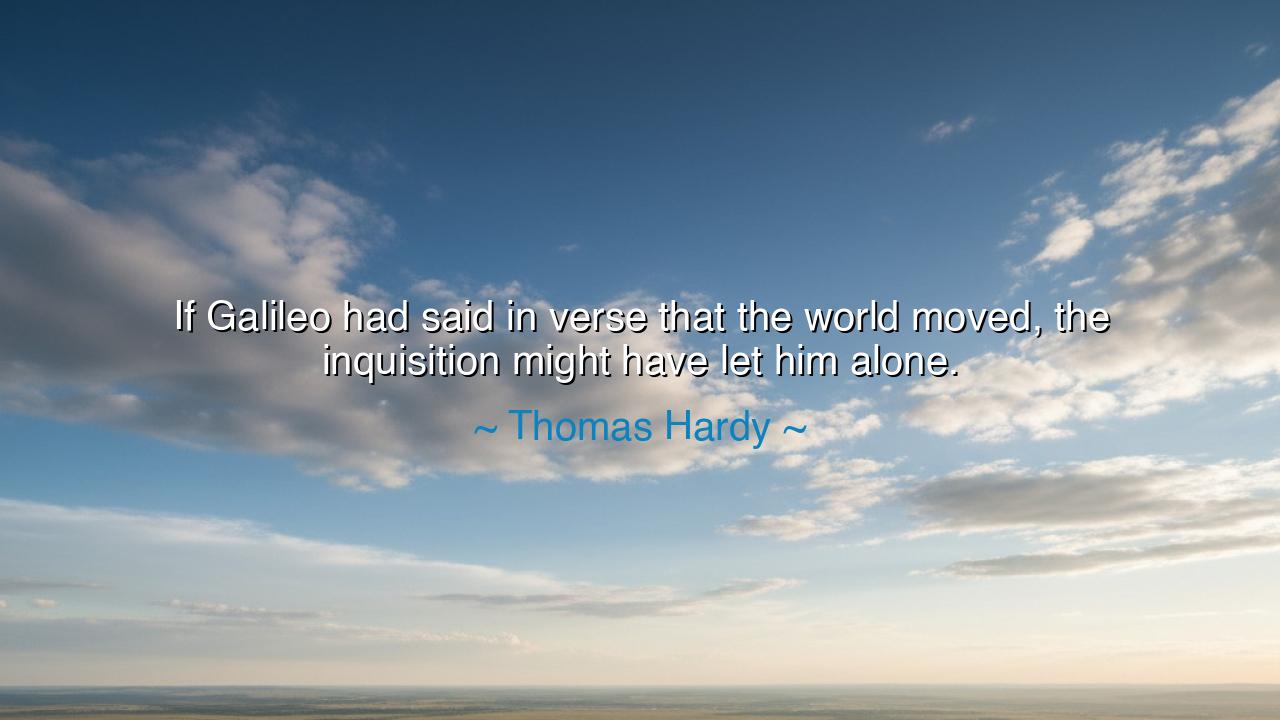
If Galileo had said in verse that the world moved, the
If Galileo had said in verse that the world moved, the inquisition might have let him alone.






"If Galileo had said in verse that the world moved, the Inquisition might have let him alone." These words, spoken by the poet Thomas Hardy, offer a profound reflection on the intersection of truth, power, and expression. In them lies a deep irony: Galileo, a man of science, was persecuted not simply for the truth he uncovered about the nature of the universe, but for the manner in which he presented that truth. Had he chosen the softer, more palatable form of poetry instead of the directness of science, his revolutionary ideas might have escaped the harsh censure of the Church. Hardy’s quote points to the tension between intellectual freedom and the rigid structures of authority—structures that often prefer comfortable rhetoric to uncomfortable truth.
Galileo, whose name is forever associated with the advancement of modern science, faced the full wrath of the Inquisition because he dared to challenge the long-standing beliefs about the cosmos. His support for the heliocentric theory—the idea that the Earth revolves around the Sun—stood in direct opposition to the Church’s geocentric view, which held that the Earth was the center of the universe. Galileo’s pursuit of truth in the form of science led to his trial and condemnation by the Church. His work, though grounded in observable evidence and rational inquiry, was seen as a threat to the doctrine that had been upheld for centuries. Hardy’s poignant observation reveals a paradox: if Galileo had veiled his revolutionary insights in the more acceptable guise of verse, his ideas might have been more easily tolerated by the powers that be.
The lesson here is not simply about the content of Galileo’s ideas, but about how the presentation of truth can shape its reception. History is filled with moments when the form of expression—whether it be scientific, artistic, or otherwise—becomes a battleground for the forces of power and change. In many instances, the pursuit of truth is not just an intellectual endeavor, but a battle for freedom against the entrenched authorities that seek to maintain control. We need not look further than the ancient philosophers who faced persecution for their ideas. Socrates, for example, was sentenced to death for corrupting the youth of Athens with his philosophical inquiries, while Plato’s works were often written in ways that avoided direct confrontation with the established powers of his time.
In a more recent context, the story of Nelson Mandela echoes Hardy’s observation. Mandela spent years in prison, not simply because of his beliefs about equality, but because of how openly he expressed those beliefs. His writings, speeches, and actions challenged the apartheid regime in South Africa, a regime that feared the power of words as much as the power of action. Had Mandela chosen a more subtle form of protest—one that did not so directly challenge the government—his movement may have been lessened or even ignored. Like Galileo, he was punished not just for his message, but for the boldness with which he declared it. Truth, when spoken plainly, has the power to unseat the status quo, and so it is often met with resistance.
But Hardy’s quote also contains a deeper truth about the nature of power itself. The Inquisition feared Galileo’s science because it threatened the religious authority that was built upon the geocentric view. In this fear, we see how power can be fragile—how even the most entrenched systems of thought can be shaken by the introduction of new ideas. It is a reminder that truth, in its purest form, is a force that cannot be contained forever, no matter how fiercely those in power try to suppress it. Resistance to truth, though often painful and destructive, ultimately serves to reveal the strength of the truth itself.
The great lesson from Hardy’s words, and from the life of Galileo, is that courage is required not only to seek the truth but also to express it. The pursuit of truth is not always a gentle journey, and those who walk that path often face great opposition. Yet, as history has shown us, it is through the unrelenting pursuit of truth, expressed boldly and clearly, that we move closer to a world where the light of knowledge can shine freely. Whether in the sciences, the arts, or the political sphere, the struggle for truth and freedom demands that we face those who would silence us—and to speak regardless.
Thus, as we reflect on Hardy’s insight, let us be reminded of the courage required in our own lives. In the face of authority, let us not hide the truth beneath veils of comfort or convenience. Like Galileo, let us stand firm in our beliefs, knowing that though the path of truth is often fraught with peril, it is the only path that will lead to a brighter, freer future. Speak the truth, in whatever form it must take, and know that it is not the form that ultimately matters—it is the truth itself, which will endure long after the voices of opposition have fallen silent.






AAdministratorAdministrator
Welcome, honored guests. Please leave a comment, we will respond soon